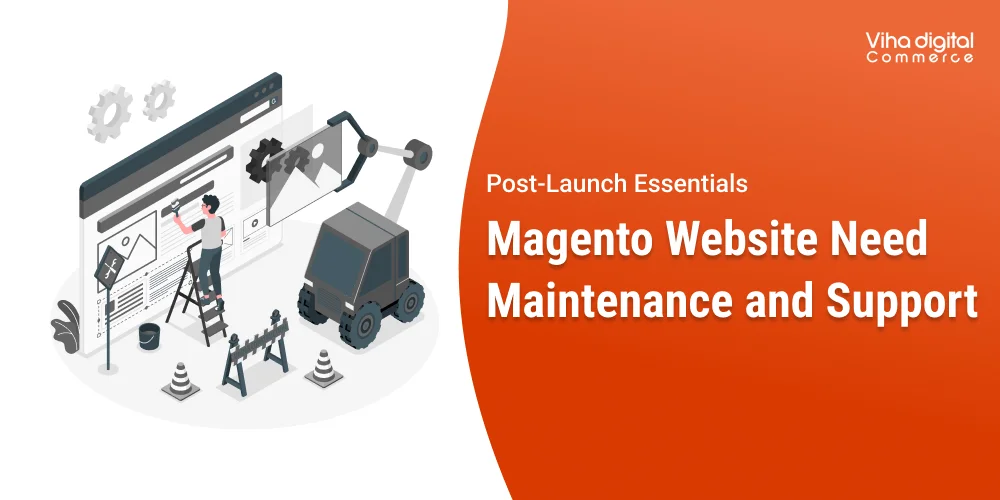
Why Does Your Magento Website Need Maintenance and Support After Launch?
Launching a Magento e-commerce website is just the beginning of your online business journey. Ensuring its continuous performance, security, and adaptability requires ongoing maintenance and support. Here’s why Magento maintenance and support are crucial for your e-commerce success, along with insights into the specific services that keep your site running smoothly and efficiently.
1. Ensuring Optimal Performancea
After launching your Magento website, it’s vital to maintain its optimal performance to ensure a seamless user experience. Regular maintenance helps identify and fix performance issues that could slow down your website. This includes monitoring server performance, optimizing database queries, and addressing any backend inefficiencies.
2. Keeping Up with Security
Security is a significant concern for any e-commerce website. Hackers are always on the lookout for vulnerabilities they can exploit. Regular Magento maintenance includes applying security patches and updates promptly. This ensures that your website remains secure against the latest threats and vulnerabilities.
3. Handling Magento Upgrades
Magento frequently releases updates that include new features, improvements, and security patches. Keeping your website updated with the latest Magento version is essential for leveraging new functionalities and maintaining compatibility with third-party extensions. Magento upgrade services ensure your site is always running on the latest version, enhancing performance and security.
4. Improving User Experience
User experience is a critical factor in the success of your e-commerce website. Regular maintenance helps in refining the user interface and ensuring that navigation is intuitive and smooth. This includes updating content, images, and ensuring that all links are functional. An improved user experience can lead to higher customer satisfaction and increased sales.
5. Monitoring and Analytics
To keep your e-commerce site competitive, it’s essential to monitor its performance continually. Regular maintenance involves setting up and analyzing web analytics to track user behavior, page performance, and sales trends. These insights help in making informed decisions to improve the website’s functionality and user engagement.
6. Extending Functionality
Your business needs might evolve over time, requiring additional features or integrations. Regular Magento maintenance includes assessing your website’s functionality and suggesting improvements or new features. This could involve integrating new payment gateways, implementing advanced search functionalities, or adding new shipping options.
7. Enhancing SEO and Marketing Efforts
Search engine optimization (SEO) is not a one-time task but an ongoing process. Regular maintenance includes updating meta tags, keywords, and content to keep up with the latest SEO trends. Additionally, it involves checking for broken links, optimizing page load times, and ensuring that your site remains search-engine friendly.
8. Providing Technical Support
Even with the best maintenance practices, issues can still arise. Having reliable technical support ensures that any problems are addressed promptly. This includes fixing bugs, resolving server issues, and providing support for third-party extensions. Continuous technical support is essential for minimizing downtime and keeping your website operational.
9. Managing Extensions and Themes
Magento’s flexibility allows you to use various extensions and themes to enhance your website’s functionality and appearance. However, these third-party components need regular updates and checks to ensure they work seamlessly with the Magento core. Maintenance involves managing these extensions and themes to avoid conflicts and ensure compatibility.
10. Data Backup and Recovery
Regular data backup is crucial for protecting your business from data loss due to hardware failures, cyber-attacks, or human errors. A comprehensive Magento maintenance plan includes automated data backups and a robust recovery strategy to ensure that your data can be restored quickly in case of any issues.
11. Compliance and Legal Requirements
E-commerce websites need to comply with various legal requirements, including data protection regulations like GDPR. Regular maintenance ensures that your website adheres to these regulations by implementing necessary changes and updates. This helps in avoiding legal issues and maintaining customer trust.
12. Cost-Effectiveness
Investing in regular maintenance might seem like an additional expense, but it can save you money in the long run. Preventive maintenance helps in identifying and resolving issues before they escalate into major problems that could lead to significant downtime or expensive repairs. A well-maintained site reduces the risk of unexpected breakdowns and ensures continuous revenue flow.
Conclusion
Magento maintenance and support are indispensable for the sustained success of your e-commerce website. From ensuring optimal performance and security to handling upgrades and enhancing user experience, regular maintenance covers all aspects necessary to keep your website running smoothly. By investing in Magento maintenance services, you not only protect your website from potential threats and issues but also ensure that it continues to meet your business needs and customer expectations.
A well-maintained Magento website can significantly contribute to your business’s growth by providing a secure, reliable, and user-friendly shopping experience. Whether it’s through regular updates, security patches, or performance optimizations, ongoing maintenance is key to maintaining a competitive edge in the ever-evolving e-commerce landscape. Choose a reliable Magento development company to handle your maintenance needs and watch your e-commerce business thrive.
editor's pick
Harnessing the Power of Magento 2 GraphQL API: A Developer’s Guide
In the dynamic world of e-commerce, efficient and flexible [...]
Unlocking the Potential of Magento 2 B2B: A Comprehensive Guide
In the world of B2B e-commerce, having a robust, [...]
Viha Digital Commerce Gets Recognized as Clutch Global Leader for Spring 2024!
It is a privilege for Viha Digital Commerce to be named [...]





